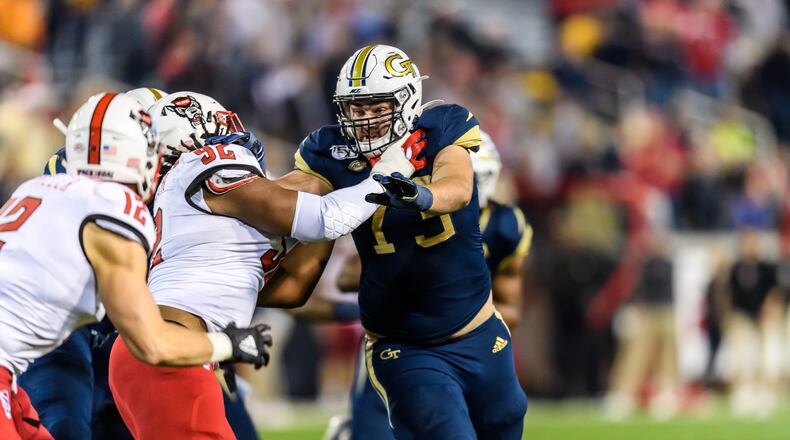What seemed an unlikelihood less than a month ago now is practically a certainty – Georgia Tech will begin its season Saturday against Florida State in Tallahassee, Fla. Coach Geoff Collins’ second season begins with dim expectations externally – ACC media picked the Yellow Jackets to finish last – but much higher within the team.
Here are five keys for success this season for Tech.
1. Offensive line health
Tech’s expected starting five on the offensive line includes two returning starters (left tackle Zach Quinney and left guard Jack DeFoor), a third who played regularly (center Mikey Minihan), a graduate transfer expected to make a big impact (right guard Ryan Johnson) and a potential star (freshman right tackle Jordan Williams). Kenny Cooper, a backup at center and guard, has also proved himself an effective interior force.
“Brent (Key) is an unbelievable (offensive line) coach,” offensive coordinator Dave Patenaude said. “He’s got those guys playing at a high level. Our first five or six guys are really good.”
Therein lies Tech’s challenge. After Cooper, there’s also William Lay, who started the final eight games of last season at center after Cooper’s season-ending hip injury. But then, there’s vast inexperience. Of the remaining eight scholarship offensive linemen, five are incoming freshmen. The three returnees have played a combined 22 games, all in a backup capacity.
A lack of experience isn’t necessarily dooming, but it’s hardly ideal. Last year, season-ending injuries to Cooper and Jahaziel Lee and Minihan’s prolonged absence with a leg injury forced Key to shuffle his lineup, no small factor in Tech’s offensive shortcomings. If Key’s starters can stay healthy, the talent around them has a chance to shine. If he has to move pieces around again, it could be another struggle.
2. Production out of defensive line
It’s no secret that Tech’s defensive line play in recent years has been a weak spot, certainly not to defensive tackle Chris Martin.
“We are not happy with how we performed last year, not happy with how we’ve been performing just the last couple years, as far as Georgia Tech’s defensive line,” Martin said. “It’s just become more personal for us to really try to change that norm that’s been for us for years and really, really take off and be the players that (defensive line coach Larry Knight) believes and sees us to be.”
Tech has more experience, as seven defensive linemen who started games last season (tackles T.K. Chimedza, Djimon Brooks and Martin and ends Jordan Domineck, Curtis Ryans, Antwan Owens and Sylvain Yondjouen) are back. Further, they have better understanding of scheme and techniques.
A year ago, Tech was not very effective against the run and didn’t disrupt quarterbacks nearly enough. A better defensive performance will have to start with this group.
3. Improvement of quarterback play
The winner of the quarterback derby to run the offense – the guess here is that it will be freshman Jeff Sims – will have to do better. Last season, starter James Graham at times played exceptionally, making plays with his arm and his feet, but completed 45.1% of his passes, the lowest of any FBS quarterback who averaged at least 15 passes and played in 75% of his team’s games.
That obviously doesn’t all fall on Graham, as protection was not always sufficient. Further, the entire offense was adjusting to a new scheme.
The more that the quarterback – or quarterbacks, among Graham, Sims, Jordan Yates and Tucker Gleason – can consistently make the right pre-snap reads and execute plays, the better Tech’s chances.
Two weeks ago, Patenaude said that Sims is prone to freshman mistakes, but “when it all goes the right way, he looks as good as anybody in the country.”
4. Win on special teams
Tech’s projection to finish in last in the ACC suggests that the Jackets won’t be winning many games by large margins. To that end, Tech’s special teams may need to be difference-making.
In the Jackets’ two ACC wins last season, Tech blocked a field-goal attempt and scored on a fake punt in one (Miami) and recovered a fumbled punt and netted 50.5 yards on four punts by Pressley Harvin in the other.
Whether it’s place-kicking or the four coverage and return units – all of which were substandard – special teams likely will have to be markedly better for improvement in the standings.
5. Staying healthy
As factors for success go, avoiding COVID-19 infection strikes a little differently as not throwing interceptions. But, practically speaking, the teams that are smart and disciplined in regards to following health and safety protocols will have a decided advantage in keeping their rosters intact. It could take only one or two infections, which could require additional players quarantined, to take a serious bite out of a team’s depth chart.
The Jackets have done well thus far in keeping themselves safe. If they can keep it up, it could be a significant edge.
About the Author
Keep Reading
The Latest
Featured


